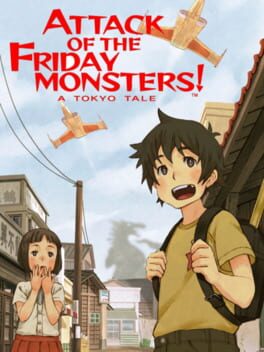El primer elemento que llama la atención en Attack of the Friday Monsters es el intenso paraje sonoro que lo impregna. Pasear por la pequeña aldea de Fuji no Hana es como sumergirte en una piscina de sonidos que capturan un momento ficticio, pero muy vívido, del suburbio japonés. A partir de ahí, el diálogo y las animaciones colaboran constantemente para insistirte en que ésta es una infancia compartida por toda una generación.
Cualquiera que haya jugado a algo de Kaz Ayabe y Millennium Kitchen sabe que éstos siempre han sido los puntos fuertes de su carrera artística, que aquí se utilizan para transmitir un mensaje muy sencillo pero poderoso: que la ficción nos forma en igual medida que nosotres moldeamos la ficción. En más de una ocasión el juego recurre a lugares comunes que este tipo de género viene repitiendo desde los tiempos de Totoro, si no antes. Lo que le hace destacar es su tremendo respeto al horizonte emocional de la juventud sin por ello esconder que se trata de un horizonte ficticio, sostenido por una mezcla de ignorancia deliberada y complicidad de les adultes.
En este respecto, es preciso que señale el increíble trabajo hecho por el equipo de localización a la hora de adaptar las idiosincrasias de Millennium Kitchen al inglés, porque no tuvo que ser fácil. Si hay una única cosa que impide a este juego ser un triunfo artístico indiscutible es el hecho de que el juego de cartas (que personalmente me encanta y adoro cómo se integra con las dinámicas de los chavales) ofusca la parte final de la obra, cuando se te permite al fin deambular por la ciudad a tu gusto.
--------------------------
The first thing that catches your eye (or rather, your ear) in Attack of the Friday Monsters is its soundscape. Strolling through the small village of Fuji no Hana is like diving into the pool of a very real, albeit fictitious, slice of Japanese suburbia. From that point on, dialogue and animations alike are in constant cahoots to convince that this is a real fragment of many people's childhoods.
Anyone who has played anything by Kaz Ayabe and Millennium Kitchen knows that these elements have always been their forte, and here they are used to convey a very simple but powerful message: that fiction shapes us as much as we shape fiction. On more than one occasion the game resorts to genre tropes that have been repeated since My Neighbor Totoro, if not before. What makes it stand out is its tremendous respect towards the emotional horizon of youth without hiding the fact of how fragile it is, sustained by a mixture of wilful ignorance and adult complicity.
In this regard, I must give kudos to the incredible localization of this game. It must've been hard to adapt Millennium Kitchen's stuff into English. If there is one thing that prevents this game from becoming an artistic triumph is the fact that the card game (which I personally love and adore how it integrates with the kids' dynamics) obfuscates the final part of the game, when you are finally allowed to wander around the city as you please.
Cualquiera que haya jugado a algo de Kaz Ayabe y Millennium Kitchen sabe que éstos siempre han sido los puntos fuertes de su carrera artística, que aquí se utilizan para transmitir un mensaje muy sencillo pero poderoso: que la ficción nos forma en igual medida que nosotres moldeamos la ficción. En más de una ocasión el juego recurre a lugares comunes que este tipo de género viene repitiendo desde los tiempos de Totoro, si no antes. Lo que le hace destacar es su tremendo respeto al horizonte emocional de la juventud sin por ello esconder que se trata de un horizonte ficticio, sostenido por una mezcla de ignorancia deliberada y complicidad de les adultes.
En este respecto, es preciso que señale el increíble trabajo hecho por el equipo de localización a la hora de adaptar las idiosincrasias de Millennium Kitchen al inglés, porque no tuvo que ser fácil. Si hay una única cosa que impide a este juego ser un triunfo artístico indiscutible es el hecho de que el juego de cartas (que personalmente me encanta y adoro cómo se integra con las dinámicas de los chavales) ofusca la parte final de la obra, cuando se te permite al fin deambular por la ciudad a tu gusto.
--------------------------
The first thing that catches your eye (or rather, your ear) in Attack of the Friday Monsters is its soundscape. Strolling through the small village of Fuji no Hana is like diving into the pool of a very real, albeit fictitious, slice of Japanese suburbia. From that point on, dialogue and animations alike are in constant cahoots to convince that this is a real fragment of many people's childhoods.
Anyone who has played anything by Kaz Ayabe and Millennium Kitchen knows that these elements have always been their forte, and here they are used to convey a very simple but powerful message: that fiction shapes us as much as we shape fiction. On more than one occasion the game resorts to genre tropes that have been repeated since My Neighbor Totoro, if not before. What makes it stand out is its tremendous respect towards the emotional horizon of youth without hiding the fact of how fragile it is, sustained by a mixture of wilful ignorance and adult complicity.
In this regard, I must give kudos to the incredible localization of this game. It must've been hard to adapt Millennium Kitchen's stuff into English. If there is one thing that prevents this game from becoming an artistic triumph is the fact that the card game (which I personally love and adore how it integrates with the kids' dynamics) obfuscates the final part of the game, when you are finally allowed to wander around the city as you please.
